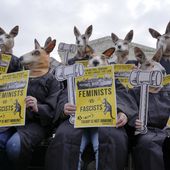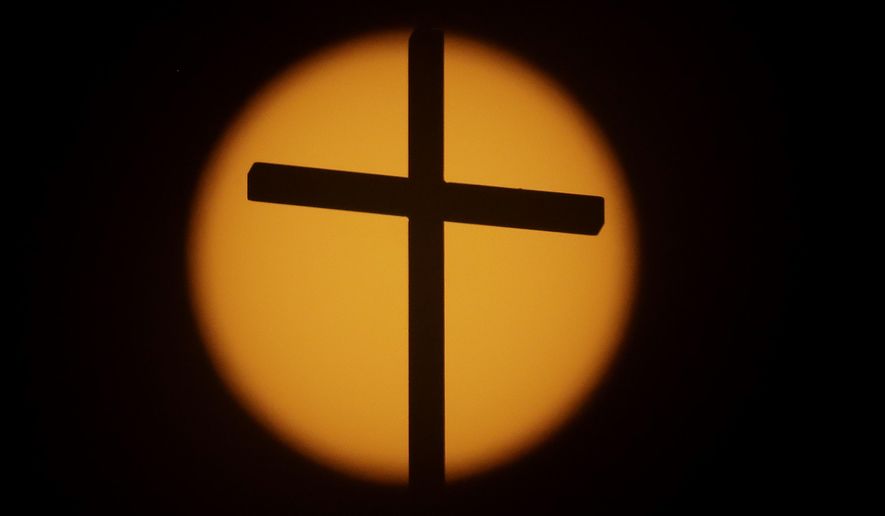Progressives say a poll showing white Christians in the minority is evidence that President Trump’s voter base is dwindling, but veterans of the religious right say rumors of the movement’s demise are greatly exaggerated.
The Public Religion Research Institute survey released Wednesday found that 43 percent of Americans identify as white and Christian, down from 81 percent as recently as 1976.
Robert P. Jones, CEO of the research institute and author of “The End of White Christian America,” said the data suggest that Mr. Trump’s “unlikely victory is better understood as the death rattle of White Christian America” rather than its resuscitation.
“Twenty years from now, there is little chance that 2016 will be celebrated as the revival of White Christian America, no matter how many Christian right leaders are installed in positions of power over the next four years,” Mr. Jones wrote in an article in The Atlantic a few days before the survey was published. “Rather, this election will most likely be remembered as the one in which white evangelicals traded away their integrity and influence in a gambit to resurrect their past.”
The downward trend affected the white population of each of the major Christian denominations, including evangelical Protestants, whose overall share of the population dropped from 16 percent to 11 percent since 2006. White mainline Protestants fell from 18 percent to 13 percent over that same span, and white Catholics from 16 percent to 11 percent.
Reasons for the decline include immigration, an aging white Christian population and increases in the number of Americans who identify as religiously unaffiliated.
America’s increasing diversity is captured in the ethnic transformation of the Catholic Church. Twenty-five years ago, nearly nine out of 10 Catholics were white. Today, Catholics younger than 30 are more likely to be Hispanic (52 percent) than white (36 percent).
Atheists and agnostics continue to comprise a larger share of the U.S. population. More than one-quarter (27 percent) of Americans today identify as religiously unaffiliated.
The religiously unaffiliated are a plurality in 20 states, including Vermont (41 percent), Oregon (36 percent), Washington (35 percent), Hawaii (34 percent), Colorado (33 percent) and New Hampshire (33 percent).
The survey also shows that the number of white Christians in the Democratic Party has declined dramatically. The demographic makes up just 29 percent of the party’s base, compared with 50 percent one decade ago.
Roughly three-quarters of Republicans still identify as white and Christian.
Tony Perkins, president of the Family Research Council, said progressives predict the end of the religious right like clockwork, especially when they lose a major national election.
“The whole point here is to try to suggest that the influence that evangelicals have in this election is — take a snapshot, take a good picture of it, because you’re not going to see it again,” Mr. Perkins said Wednesday on Fox News Radio’s “Todd Starnes Show.” “Look, this is a phenomenon that occurs every election cycle.”
Mr. Perkins recalled headlines in major newspapers throughout the 1990s forecasting the fall of Christianity and its influence in the political arena.
“I went back and just looked,” he said. “Back in 1990, there was a story from The Washington Post saying, ‘The bloom is off, religious right scholars at conference agree. Movement criticized for lacking political finesse.’ Basically, the religious right has fallen on hard times and it’s going away.”
The survey does show that white Christians have aged in a way that other major religious groups in America have not.
More than one-third of Muslims, Hindus and Buddhists in America are younger than 30. By contrast, just 11 percent of white Catholics, 11 percent of white evangelical Protestants and 14 percent of white mainline Protestants are younger than 30.
Sixty-two percent of white Catholics, 62 percent of white evangelical Protestants and 59 percent of mainline Protestants are at least 50 years old.
Mr. Starnes said the diversification of evangelical Christians is a good trend.
“Many of those in the, you know, Hispanic evangelicals — very conservative members,” the radio show host said. “So I think that bodes well for the future of the country and, quite frankly, for the future of evangelicals as well.”
The PRRI survey’s findings are based off of the 2016 American Values Atlas, the largest survey of American religion ever conducted. It includes a sample of more than 101,000 Americans from all 50 states and has a margin of error of 0.4 percentage points.
• Bradford Richardson can be reached at brichardson@washingtontimes.com.




Please read our comment policy before commenting.